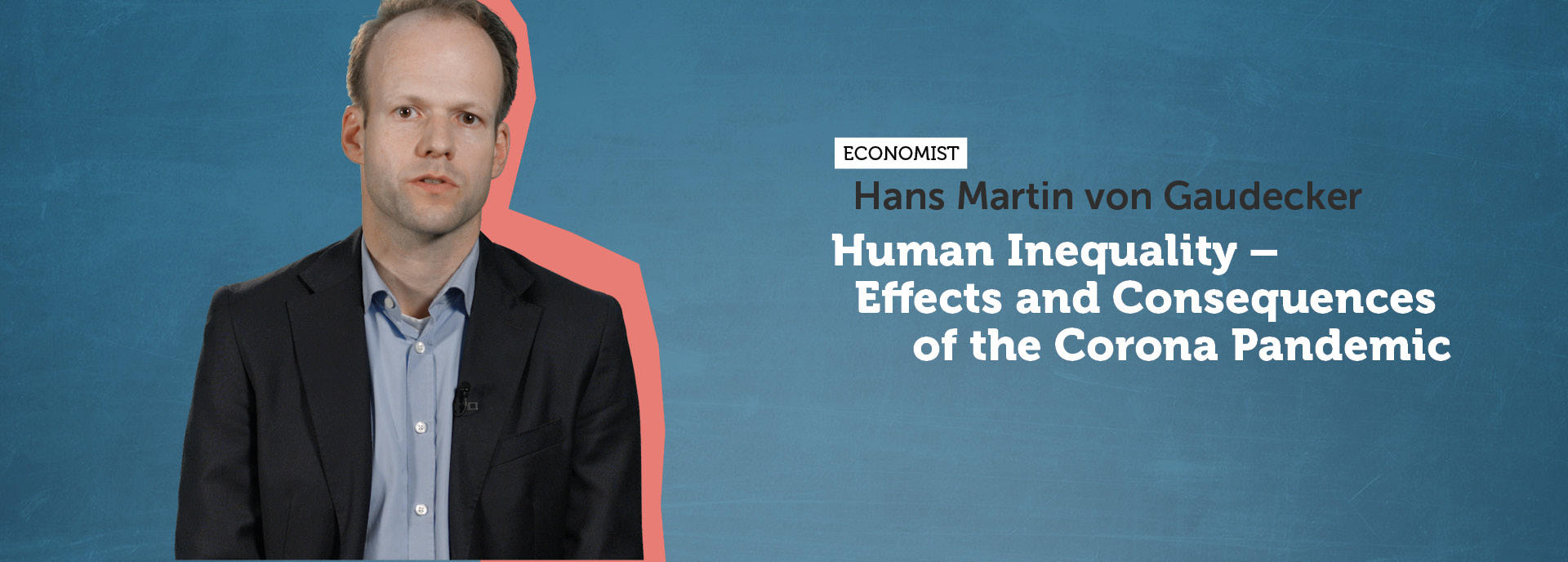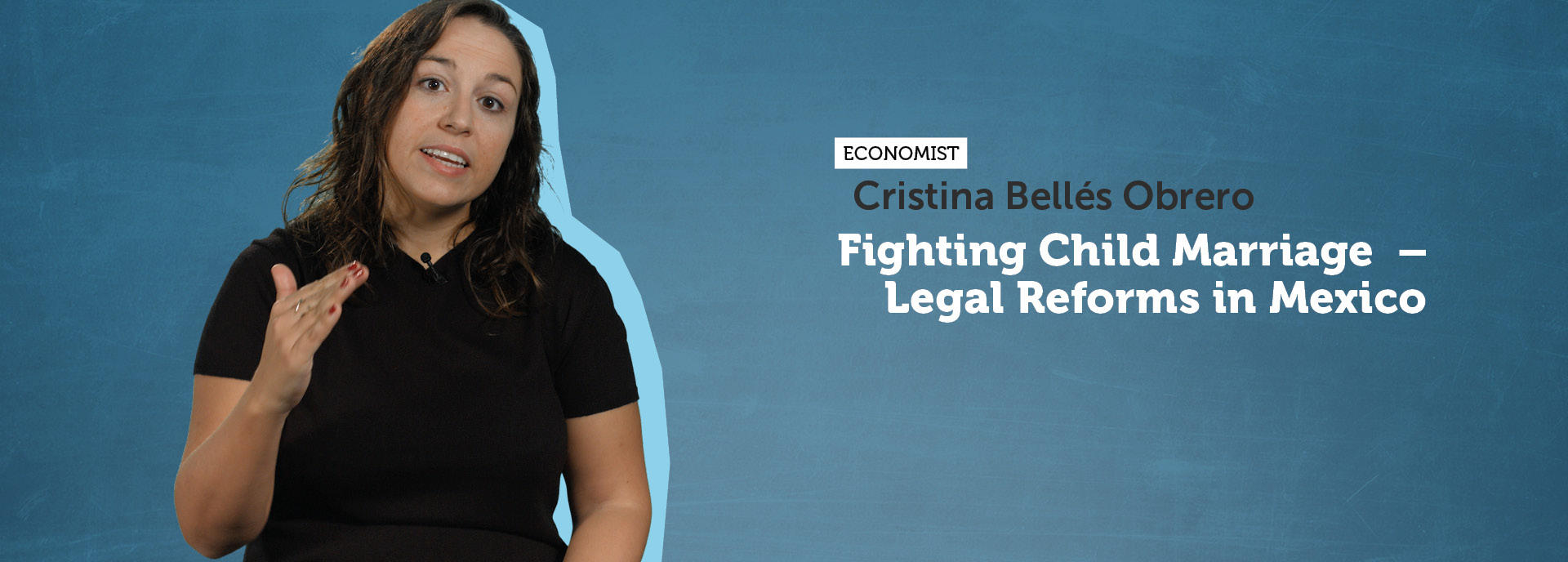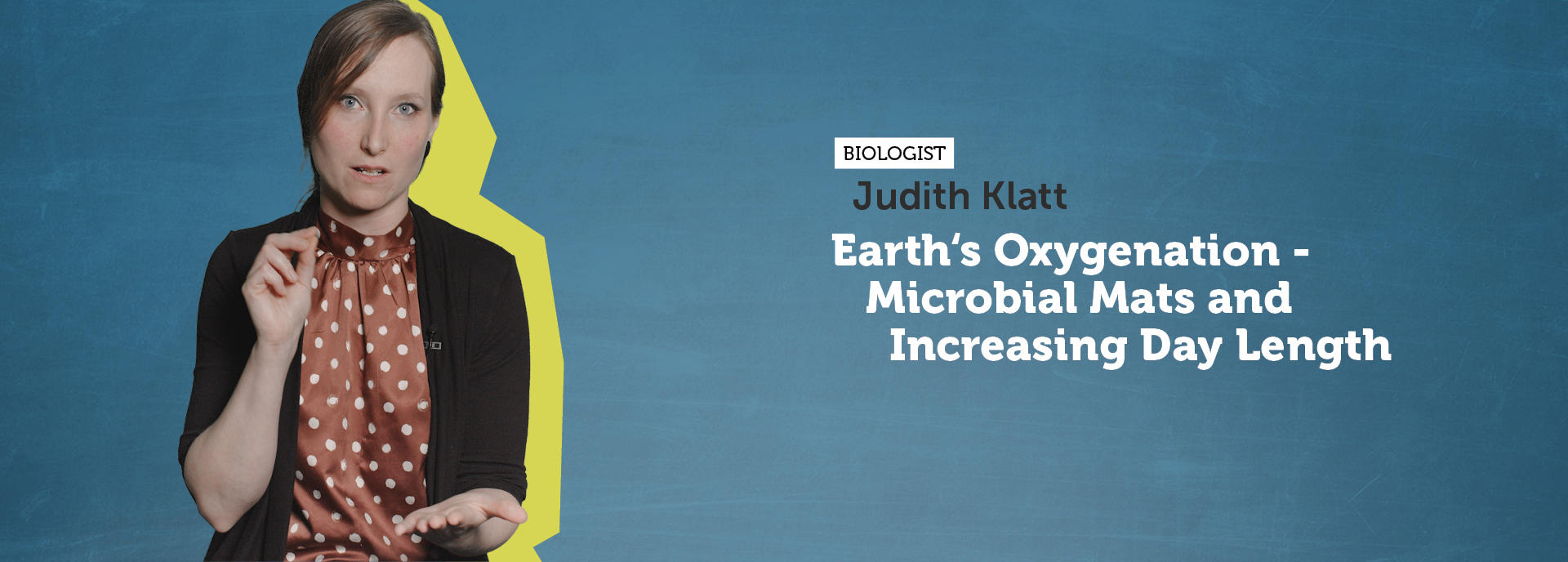Behavioral Economics
Economic preferences that relate to time (patience), risk taking and social interaction have been shown to play an important role in life success. In this video, MATTHIAS SUTTER explores how these economic preferences are formed in early life and adolescence. Carrying out economic experiments and collecting survey data among 500 families in rural Bangladesh, Sutter finds that children adopt almost entirely the economic [...] Watch video
How Do People Make Timing Decisions in Situations Where They Have Little Experience and Insufficient Data?
Individuals and governments often do not have as much time or experience as they would like when they need to make a decision. In this video, SARAH AUSTER explores the mechanism by which such decisions are made. Building a game theoretical model that draws on auction theory and decision theory, Auster’s work shows that certain forms of auction design favor the seller and that supplementary information provided to [...] Watch video
To identify the best possible outcome, decision makers require information. In this video, SI CHEN explores information acquisition strategy and seeks to pinpoint when and why decision makers conclude that they have done sufficient research. In a laboratory experiment, decision makers are paired with receivers who, though affected by the decision, can only passively observe it. Decision makers have access to information [...] Watch video
In considering their impact on climate change, individuals naturally think about consumption. In this video, HENDRIK HAKENES argues that people need to give equal weight to their investments. Hakenes constructs a mathematical model which allows him to explore the effectiveness of different decisions around consumption and investment. Though conventional wisdom suggests that reducing consumption takes priority, the [...] Watch video
Algorithms and artificial intelligence are playing an increasing role in public decision making. In this video, PASCAL LANGENBACH analyzes the ways in which this aspect of digitalization affects perceptions of fairness. Looking at the contexts of predictive policing, school admissions and refugee location, Langenbach examines four different procedural models ranging from situations where human actors decide alone to [...] Watch video
External stimuli are increasingly prevalent in the digital age, competing for our attention, urging us to action. In this video, MATTHIAS PELSTER explores the extent to which attention triggers (like push notifications) increase risk taking in financial markets. Focusing on customers of a large broker, Arnold, Pelster & Subrahmanyam are able to use a difference-in-differences approach to compare the behaviors of those who [...] Watch video
People’s honesty is often a crucial consideration in politics and in economics as well as in society more generally. In this video, URS FISCHBACHER outlines his development of an instrument to measure honesty and patterns of dishonesty. Participants rolled a die and were told that their number corresponded to a payoff. Though the experiment showed that people were dishonest, it also demonstrated that this was not always [...] Watch video
How people form beliefs (about the stock or housing markets for example) is an important area of study for economists. In this video, FLORIAN ZIMMERMANN explores the role that memory plays in belief formation. More specifically, Zimmermann studies associative recall, the way in which the recall of memory trace is triggered by cues that are mentally associated with that trace. Zimmermann’s experiment involves [...] Watch video
The compromise effect can be observed in the consumer’s tendency to avoid extreme ends of the available range when making purchasing decisions. In this video, MARKO SARSTEDT investigates the origins of the compromise effect. Describing an experiment that interrogates the effects of a lowering of cognitive capability on purchasing decisions, Sarstedt argues that rather than involving fast or intuitive decision making, [...] Watch video
As explained in this video it is commonly assumed that logically incoherent decision-making is irrational and costly in that it can lead e.g. to a decrease in happiness or health. An example for this would be a patient reacting differently if doctors speak of a 90% success rate of a surgery instead of a 10% failure rate for the same procedure. The purpose of the study presented here was to examine if there is proof in the [...] Watch video
Risk perception is not only an individual but also a social phenomenon. The experiment presented in this video examines the development of perceived risk over the course of a communication chain: The first person got a balanced overview on a chemical and its risks then information was passed on from person to person. WOLFGANG GAISSMAIER elaborates how this set up led to an amplification of risk perception and the [...] Watch video
In the eye-tracking experiment presented in this video it was observed how people make choices in different environments. The results show that people adapt their decision behavior only gradually to different situations and do not switch between different strategies, as often hypothesized. As ANDREAS GLÖCKNER explains this new single-strategy model fits reality better and thus is apt to produce insights for public [...] Watch video
Economic theory assumes that individuals are self-interested and that they will lie for material advantage. However, this is not always the case as lies have costs. In this video, JOEL SOBEL investigates the precise nature of these costs. Developing a theoretical model of the costs of lies, Sobel tests the resulting hypotheses in laboratory experiments. Though the work shows that a majority of subjects lie to the maximum [...] Watch video
Mostly, reciprocity is seen as a positive act. It helps people to cooperate and to engage in mutually beneficial exchange. KLAUS M. SCHMIDT, however, is interested in the negative aspects of reciprocity, for instance when a decision maker is offered a gift by an interested party. His research is focused on two aspects: Why do people reciprocate? And are the remedies discussed, such as disclosure and size limits, really [...] Watch video
The ultimatum game is one of the most famous experiments in economics. It involves two players, one of them receives a sum of money which he has to share with a second player. The first player, the “proposer”, can decide how much he offers the second player, called “responder”, who can either accept or reject the offer. If the responder rejects, neither of the players receives any money. Mathematically, the first [...] Watch video
In recent years, immoral behavior in firms as well as scandals in the banking sector and non-profit organizations have been widely discussed. Often it is groups rather than individuals who are responsible for these immoral acts. This video presents an economic experiment that investigates whether groups are more likely to lie than individuals; and why this might be the case. As SIMEON SCHUDY explains, significantly more [...] Watch video
Development Economics, Innovation & Growth
The share of Chinese people with college education and the wage premium that they earn has increased dramatically since 1990. In this video, LEI LI explores the factors underlying this and argues that it can be partially attributed to the importation of machinery. Analyzing population data from the 330 Chinese prefectures and exploring regional differences in machinery importation, Li finds that the importation of [...] Watch video
While the environmental benefits of installing photovoltaic systems are clear, the costs can remain off-putting for private households. In this video, SVEN MÜLLER explores the relevance of the peer effect (neighbors already having the technology) in a decision to install a photovoltaic system. Establishing an installed base and considering fixed effects alongside an instrumental variable approach, Müller finds that peer [...] Watch video
Innovation can be both creative and destructive. It creates new patterns of social and economic life, while at the same time destroying or reforming existing ones. That means that innovations are the product of a given economic system and at the same time change the system they are part of. As UWE CANTNER points out in this video, the economics of innovation and change is shaped by different actors, which influence each [...] Watch video
As well as resulting in frustration for drivers, traffic congestion leads to significant economic costs. In this video, PETER CRAMTON argues that a properly implemented road pricing system can enable us to eliminate traffic congestion in urban areas. The study explains that once road usage is accurately measured, principles of market design can be used to develop and implement a highly efficient pricing system with [...] Watch video
In this video, MARKO SARSTEDT analyzes the long-term effects of ambient scents in sensory rich environments. Having identified an ideal industry partner in the German railway corporation, die Deutsche Bahn, the research team deployed a specially created scent in train compartments over a 4 month period. Regular commuters were surveyed about their perceptions of service though 9 study waves. As expected, assessments of the [...] Watch video
What are the longrun implications of elite universities for individuals and society? In this video, KATJA KAUFMANN explores the effects of elite higher education on both marriage and intergenerational outcomes. Employing a regression discontinuity design and an unique data set collected and digitized from Chilean archives and matched with information from the Chilean Ministry of Justice, Kaufmann identifies significant [...] Watch video
What Information Should Smart Meters Provide To Effectively Reduce Energy Consumption?
The rollout of smart electricity meters is gathering pace in the EU as in the US. In this video, ANDREAS GERSTER asks what information smart meters should provide to bring about an optimal reduction in energy consumption. Comparing the effectiveness of aggregate data and appliance specific feedback, Gerster shows that more detailed information can help households to significantly limit their electricity use. Highlighting [...] Watch video
Responding to environmental concerns, many countries are restructuring their electricity supply. In this video, HEINZ WELSCH examines the nature of the relationship between electricity supply structure and citizen well-being. Combining data from the European Social Survey with information on different national electricity supply models, among the study’s findings is the observation that though wind energy is generally [...] Watch video
Lifestyle and demographic changes have led to diabetes becoming increasingly prevalent in rich and poor countries alike. In this video, SEBASTIAN VOLLMER assesses the global economic burden of diabetes. Going beyond previous studies in its recognition of the differing costs relating to such chronic conditions in both high and low-income countries, the research concludes that the economic burden of diabetes amounts to [...] Watch video
The "Real" Tragedy of the Commons: Can a Dual Currency System Achieve a Pareto-superior Equilibrium?
Global common public goods (like quality education, clean energy and gender equality) formed the basis of the 17 Sustainable Development Goals (SDGs) agreed by world leaders in New York in 2015. In this video, noting that proposed levels of investment in SDGs are grossly insufficient, STEFAN BRUNNHUBER argues that a redesign of our monetary system would make realization of the SDGs more likely. Analyzing the ways in which [...] Watch video
Customer-company relationships are increasingly conducted via internet-based technologies. In this video, LENA STEINHOFF explains her work towards developing a theoretically grounded and managerially relevant framework for managing customer relationships online. Focusing on current business practices and extant research, Steinhoff identifies five aspects that distinguish the online customer-firm relationship from its [...] Watch video
After Joseph Schumpeter, economists have given much credence to the role that new business formation plays in regional economic development. In this video, MICHAEL FRITSCH argues that not all Start-Ups are created equal and proposes a more balanced assessment of the factors underlying economic development. Fritsch’s research takes a region-based approach and finds that up to two-thirds of the positive economic effects [...] Watch video
Good entrepreneurs play a key role in helping poor countries to prosper. In this video, MICHAEL FRESE asks us to consider the fundamental importance of psychological mindset in the development of successful entrepreneurs. Over a two year period, Frese analyzed outcomes achieved by groups of entrepreneurs that had received different forms of training and found that individuals who had been trained to develop an [...] Watch video
Public policy discussions have tended to assume that reducing gender inequality in areas including education, labor force participation and pay will automatically lead to improved economic performance. In this video, STEPHAN KLASEN reviews existing economics research in order to determine whether this assumption is robust. Examining theoretical models, accounting studies, cross-country regressions, and micro-level [...] Watch video
Does the Instrument of Opposition During the Patent Filing Process Need to Be Improved?
Patents are a very useful tool for supporting innovations by setting incentives for companies to invest in research and developments. However, only those innovations should be protected by a patent that are truly inventive. Otherwise, patents might actually end up stifling innovations rather than supporting them. This happens in the case of patent thickets where there are overlapping patents that block each other. DIETMAR [...] Watch video
Law and Economics
Algorithms and artificial intelligence are playing an increasing role in public decision making. In this video, PASCAL LANGENBACH analyzes the ways in which this aspect of digitalization affects perceptions of fairness. Looking at the contexts of predictive policing, school admissions and refugee location, Langenbach examines four different procedural models ranging from situations where human actors decide alone to [...] Watch video
With a population exceeding 500 million, the participation of less than 5 million EU citizens in a recent survey on abolishing daylight saving was, to say the least, disappointing. In this video, THOMAS TRÖGER explores how voting rules can be used to account for the problem of voter abstention. Analyzing how voter actions will result in optimal outcomes (Nash Equilibrium) under different voting rules, Tröger identifies [...] Watch video
Does the Instrument of Opposition During the Patent Filing Process Need to Be Improved?
Patents are a very useful tool for supporting innovations by setting incentives for companies to invest in research and developments. However, only those innovations should be protected by a patent that are truly inventive. Otherwise, patents might actually end up stifling innovations rather than supporting them. This happens in the case of patent thickets where there are overlapping patents that block each other. DIETMAR [...] Watch video
Can Legal Reforms Effectively Combat the Negative Consequences of Child Marriage?
With proven detrimental impacts on women and their offspring, preventing child marriage is an important aspect of the struggle to reduce global poverty.In this video, CRISTINA BELLÉS-OBRERO analyzes the effectiveness of legislative measures designed to combat child marriage in Mexico since 2014. Taking advantage of the fact that the laws were implemented gradually by the different Mexican states, applying a ‘difference [...] Watch video
Even in the absence of absolute property rights, ex-post bargaining may lead to efficient distribution of goods, CHRISTOPH ENGEL explains in this video. The findings of this research thus extend the domain of the Coase theorem. In the experiment, with a society of two individuals and a single commodity, a good ends up with the individual who values it most even if only relative property rights – i.e., rights only [...] Watch video
The research presented in this video tackles the old philosophical question on the reasons for social order with the means of modern economics. As HARTMUT KLIEMT elaborates, the rational choice assumption – that human behavior is guided by looking at causal consequences – cannot explain sufficiently why social order exists, because it does not account for rule-following behavior. Thus he shows that economic models of [...] Watch video
What Can a Behavioral Perspective Teach Us on the Relationship Between Law and Morality?
The research presented in this video analyzes the relationship between law and morality, and asks what role morality plays in social interactions. Using empirical findings from social psychology, behavioral law and economics, it is deduced what people generally perceive as just or fair. The findings show that moral rules enable cooperation and how moral intuitions impact rule following behavior. As STEFAN MAGEN explains, [...] Watch video
Parliaments and parliamentary committees can resolve binary decisions by simple majority voting. In this video, BENNY MOLDOVANU considers the impact of voting procedures on more complex decisions, analyzing factors including the order and sequencing of votes. Modeling the games that specific voting procedures induce, the work also compares the theoretical outcomes to what actually happens in parliamentary practice. [...] Watch video
Is the ‘Independent Director’ an Effective Corporate Governance Tool Across National Jurisdictions?
The ‘independent director’ was introduced as a corporate governance tool in the United States in the 1970s and quickly spread to the United Kingdom and from there to Continental Europe and Asian economies. The research presented in this video examines whether this legal transplant works in economies that have different shareholder structures and thus different agency conflicts than the US, and asks why these countries [...] Watch video
In the large-scale natural field experiment presented in this video different treatments to induce compliance with the law were tested: Potential evaders of TV license fees in Austria received different mailings – one presenting the prospects of financial and legal consequences, one appealing to morals and one communicating high compliance rates. CHRISTIAN TRAXLER explains that only the threat of consequences had a [...] Watch video
Industrial Economics
When it is highly publicized that a product is defective, contaminated or harmful, this is known as a product harm crisis. In this video HELENA PERRONE explores how consumers react to such an event. Focusing on the French “mad cow” crisis which began in 2000 and combining a theoretical model with a comprehensive dataset, Perrone finds that small drops in sales in response to such a crisis can conceal consumers’ real [...] Watch video
What Is the Relationship Between Market Share and Financial Firm Performance?
Increasing market share is a central aim for many businesses. In this video, ALEXANDER EDELING and ALEXANDER HIMME ask whether the pursuit of market share should retain its primacy in the era of globalization and digitization. Employing a meta analysis and drawing on data collected in 89 individual empirical studies, the authors assert that marketing assets like customer relationship and brands have a much more [...] Watch video
Fieldwork has demonstrated that entrepreneurial behavior and economic theory do not work in the same ways in different national, cultural or regulatory contexts. In this video, FRIEDERIKE WELTER analyzes the importance of context in entrepreneurship research. Developing an interdisciplinary approach that draws on insights from philosophy, anthropology, ethnology, and linguistics, Welter examines how contextual issues have [...] Watch video
In the internet age, digital platforms are providing increasingly important settings for buyers and sellers to interact. In this video, MARTIN PEITZ investigates why some markets tend to be dominated by single platforms (e.g. Google for internet search) while others (e.g. hotel booking) allow multiple platforms to profitably co-exist. Using theoretical modeling, the research indicates that sellers in particular markets [...] Watch video
In recent years, corporations have become more decentralized and decision-making power within the company has moved from the top level to lower levels of management. DALIA MARIN and her research team are interested in the question of how international trade has affected these changes in the organization of firms. As she explains in this video, they have used recent mathematical models of trade and have combined these with [...] Watch video
Monetary incentives, even though apparently efficient in driving performance of workers, have drawbacks, explains BRUNO S. FREY. They can result in a reorientation of workers from their focus on quality towards merely meeting objectives. The experiment presented in this video studies the impact of replacing monetary incentives with symbolic awards. The positive effect on the performance of workers highlights the potential [...] Watch video
Innovation can be both creative and destructive. It creates new patterns of social and economic life, while at the same time destroying or reforming existing ones. That means that innovations are the product of a given economic system and at the same time change the system they are part of. As UWE CANTNER points out in this video, the economics of innovation and change is shaped by different actors, which influence each [...] Watch video
Innovation is very important for economic growth and, often, small start-ups are a key generator of innovation. For this, access to patents is essential for innovative start-ups. However, a few dominant companies often hold these patents in a market field and refuse to license their technology to others, as MONIKA SCHNITZER explains in this video. She has investigated whether antitrust measures, such as compulsory [...] Watch video
Does the Instrument of Opposition During the Patent Filing Process Need to Be Improved?
Patents are a very useful tool for supporting innovations by setting incentives for companies to invest in research and developments. However, only those innovations should be protected by a patent that are truly inventive. Otherwise, patents might actually end up stifling innovations rather than supporting them. This happens in the case of patent thickets where there are overlapping patents that block each other. DIETMAR [...] Watch video
Does Knowledge About the Presence of a Maverick in the Market Influence the Price Level?
The experiment presented in this video constructs a heterogeneous duopoly of firms – on the one hand a firm with an internal structure leading to low prices, and on the other hand a firm acting collusively in price-setting. MICHAEL KURSCHILGEN explains that transparency about the competitor’s internal structure hampers tacit collusion: If the collusive firm is aware of the other firm’s internal structure, the firms [...] Watch video
Does Compensation by Stock Options Induce Excessive Risk Appetite in Executives?
In the laboratory experiment presented in this video, experimental CEOs were compensated either through stock options or restricted company stock. It shows that stock options induce excessive risk-taking in some cases and that company performance is generally better under compensation through restricted company stock. As FERDINAND M. VIEIDER points out, the main determinant of risk-taking under compensation through stock [...] Watch video
The field experiment presented in this video shows that the level of donations can be raised by suggesting a concrete contribution amount to potential donors. As MAJA ADENA explains, the effects were threefold: the average donation level rose, the different suggested amounts were respectively donated more often in the treatment groups during the experiment, and they were still more often after the experiment, when no [...] Watch video
Firms, be it coffee shops or airlines, often try to bind customers with exclusivity rebates rewarding loyalty. The lab experiment presented in this video reveals that these programs are “sticky”: customers stay in those programs longer than would be “rational”. As ALEXANDER MORELL explains, customers often don’t switch to alternatives even if reaching the rebate becomes improbable. Contrary to common behavioral [...] Watch video
Labor and Demographic Economics
Ongoing crises around the world prompting refugees to flee their homelands beg us to consider the economic effects of international migration. In this video, ANTONIO CICCONE explores the case of mass migration to what would become West Germany in the immediate aftermath of World War II. Comparing the French occupation zone which restricted access to refugees with the US zone which accepted them, Ciccone and Jan Nimczik [...] Watch video
What costs are involved when a worker loses their job? In this video, Hannah Illing compares the costs of losing a job for men and women. Forming statistical pairs to undertake a valid comparison, Illing’s research shows that women bear substantially higher costs than men when they lose a job and this can be exacerbated by their having children. Illing also ponders how Covid-19 might also have an impact in this regard, [...] Watch video
With longevity increasing and public pensions shrinking, old age poverty is a pressing issue in many economies. Noting that this issue has particular impact on women, in this video, HAN YE explores the extent to which additional pension benefit affects workers’ decisions on when to retire. Focusing on a German pension subsidy scheme introduced in 1992, Han Ye’s study breaks new ground in its isolation of the causal [...] Watch video
Evaluation, of job candidates for example, often takes place in a sequence. In this video, JONAS RADBRUCH investigates how this sequential process influences outcomes. Studying data from an admissions as well as a hiring process, the work demonstrates that the immediately preceding candidate in a sequence has a very striking influence on the chances of success for the person that follows. The research calls for more work [...] Watch video
Monetary incentives, even though apparently efficient in driving performance of workers, have drawbacks, explains BRUNO S. FREY. They can result in a reorientation of workers from their focus on quality towards merely meeting objectives. The experiment presented in this video studies the impact of replacing monetary incentives with symbolic awards. The positive effect on the performance of workers highlights the potential [...] Watch video
Can Legal Reforms Effectively Combat the Negative Consequences of Child Marriage?
With proven detrimental impacts on women and their offspring, preventing child marriage is an important aspect of the struggle to reduce global poverty.In this video, CRISTINA BELLÉS-OBRERO analyzes the effectiveness of legislative measures designed to combat child marriage in Mexico since 2014. Taking advantage of the fact that the laws were implemented gradually by the different Mexican states, applying a ‘difference [...] Watch video
Parliaments and parliamentary committees can resolve binary decisions by simple majority voting. In this video, BENNY MOLDOVANU considers the impact of voting procedures on more complex decisions, analyzing factors including the order and sequencing of votes. Modeling the games that specific voting procedures induce, the work also compares the theoretical outcomes to what actually happens in parliamentary practice. [...] Watch video
The employment rate for married women with children varies significantly between different countries. In this video, ANNE HANNUSCH analyzes this phenomenon, focusing on the differences between Denmark and the USA. Developing a quantitative economic model and exploring the effects of child care costs and family transfer programs, Hannusch finds that how we design and distribute the latter is vital in helping married [...] Watch video
Caseworkers try to help unemployed people to find work, providing support and assistance in regularly scheduled meetings. In this video, AMELIE SCHIPROWSKI seeks to quantify the economic value of these caseworker meetings. Relying on data from Swiss unemployment registers and focusing on the impact of unplanned caseworker absences, Schiprowski identifies a clear correlation between the frequency of caseworker meetings and [...] Watch video
How Can We Assess the Nature and the Effectiveness of Informal Political Processes?
Informal political processes like polls, petitions and protests have become easier to organize in the social media age. In this video, STEPHAN LAUERMANN explores both the nature of these processes and how we can assess their effectiveness. Using game theory to analyze three dimensions of participants’ motives for taking part in informal political processes, Lauermann finds that where participation involves costs, this [...] Watch video
Periods of non-work occur when employees are at work but not working (outside of scheduled breaks). In this video, MICHAEL C. BURDA analyzes the incidence and intensity of non-work in the United States, considering how it fits in with the business cycle. Drawing on data from the American Time Use Survey, Burda develops a model based on the efficiency wage theory. His research presents some striking insights into the [...] Watch video
Does Compensation by Stock Options Induce Excessive Risk Appetite in Executives?
In the laboratory experiment presented in this video, experimental CEOs were compensated either through stock options or restricted company stock. It shows that stock options induce excessive risk-taking in some cases and that company performance is generally better under compensation through restricted company stock. As FERDINAND M. VIEIDER points out, the main determinant of risk-taking under compensation through stock [...] Watch video
Gender inequality remains a widespread problem in labor markets. In this video, MARCELA IBÁÑEZ-DÍAZ asks whether affirmative action is an effective policy for reducing disparities between men and women in terms of pay and access to employment. The research team set up an experiment which revealed gender disparities in application rates for a job, based on the foregrounding of affirmative action. Ibáñez-Díaz [...] Watch video
Immigrants typically perform much worse than natives in the labor market. Focusing on amendments to German citizenship law enacted since reunification, in this video, CHRISTINA GATHMANN examines the impact of those reforms on the integration of immigrants in the German labor market. The study finds that the German liberalization of citizenship policy by shortening residency requirements improved both employment rates and [...] Watch video
Public policy discussions have tended to assume that reducing gender inequality in areas including education, labor force participation and pay will automatically lead to improved economic performance. In this video, STEPHAN KLASEN reviews existing economics research in order to determine whether this assumption is robust. Examining theoretical models, accounting studies, cross-country regressions, and micro-level [...] Watch video
The findings on the relation between economic development and life expectancy at birth have long been contradictory. In the theoretical model and data analysis presented in this video it is shown that prolongation of life expectancy is a turning point for economic development: As UWE SUNDE explains, the effect of life expectancy on income is negative before the transition to low birth and death rates, and positive [...] Watch video
Employers and human resource managers in all sectors face the challenge of first selecting “good” employees and, once employed, motivating them to strive. As the paper presented in this video exhibits, the two tasks are closely connected: The laboratory experiment showed that workers’ “trustworthiness”, has a strong positive impact on their inclination to return wage-gifts by working harder. Hence employers [...] Watch video
Mathematical & Quantitative Methods
People’s honesty is often a crucial consideration in politics and in economics as well as in society more generally. In this video, URS FISCHBACHER outlines his development of an instrument to measure honesty and patterns of dishonesty. Participants rolled a die and were told that their number corresponded to a payoff. Though the experiment showed that people were dishonest, it also demonstrated that this was not always [...] Watch video
Claims that less than 10% of published scientific papers can be reproduced have led to increased interest in replication, a process whereby researchers check the validity of published empirical findings. In this video, MAREN DUVENDACK investigates why replication has faced particular resistance in economics. Analyzing some 200 replication studies that have appeared in leading economics journals over the past 60 years, [...] Watch video
Social science researchers need to use modeling to understand complex real-life phenomena. But how does a researcher decide which of the available models is most appropriate? In this video, MARCO SARSTEDT analyzes the metrics employed by researchers in assessing PLS (Partial Least Squares) models, outlining how such assessments can be optimized. Running a Monte Carlo simulation study, Sarstedt explains the inadequacies [...] Watch video
The health insurance market is driven by the individual choices consumers make on their insurance plans. The research presented in this video explores the questions of how consumers choose these plans, whether they are able to pick the plan most suited to their situation and whether they switch to another and better health insurance plan when they have the opportunity to do so. JOACHIM WINTER explains that, after running [...] Watch video
Economic theory assumes that individuals are self-interested and that they will lie for material advantage. However, this is not always the case as lies have costs. In this video, JOEL SOBEL investigates the precise nature of these costs. Developing a theoretical model of the costs of lies, Sobel tests the resulting hypotheses in laboratory experiments. Though the work shows that a majority of subjects lie to the maximum [...] Watch video
Do Financial Incentives Help Obese People to Achieve and to Maintain a Target Weight?
By means of a field experiment, the research presented in this video tested the effects of financial incentives on the dieting behavior of obese people. As CHRISTOPH M. SCHMIDT explains, patients leaving rehabilitation clinics have been selected for the study and were given different treatments to help them achieve their target weight. It shows that those patients who received a financial incentive were more successful in [...] Watch video
The model presented in this video combines a game theoretic approach with mechanism design to examine the influence of competition on welfare maximization by politicians. It is shown that in “pure” competition between two politicians only the allocation of favors to the electorate helps winning elections, while welfare-maximizing tools of redistribution do not improve a politician’s vote-share. As FELIX BIERBRAUER [...] Watch video
Mostly, reciprocity is seen as a positive act. It helps people to cooperate and to engage in mutually beneficial exchange. KLAUS M. SCHMIDT, however, is interested in the negative aspects of reciprocity, for instance when a decision maker is offered a gift by an interested party. His research is focused on two aspects: Why do people reciprocate? And are the remedies discussed, such as disclosure and size limits, really [...] Watch video
Even in the absence of absolute property rights, ex-post bargaining may lead to efficient distribution of goods, CHRISTOPH ENGEL explains in this video. The findings of this research thus extend the domain of the Coase theorem. In the experiment, with a society of two individuals and a single commodity, a good ends up with the individual who values it most even if only relative property rights – i.e., rights only [...] Watch video
In the large-scale natural field experiment presented in this video different treatments to induce compliance with the law were tested: Potential evaders of TV license fees in Austria received different mailings – one presenting the prospects of financial and legal consequences, one appealing to morals and one communicating high compliance rates. CHRISTIAN TRAXLER explains that only the threat of consequences had a [...] Watch video
Does Knowledge About the Presence of a Maverick in the Market Influence the Price Level?
The experiment presented in this video constructs a heterogeneous duopoly of firms – on the one hand a firm with an internal structure leading to low prices, and on the other hand a firm acting collusively in price-setting. MICHAEL KURSCHILGEN explains that transparency about the competitor’s internal structure hampers tacit collusion: If the collusive firm is aware of the other firm’s internal structure, the firms [...] Watch video
The paper presented in this video, from the field of financial mathematics, addresses the problem of building optimal loan portfolios and develops a novel computational method to do so even if with an infinite number of loans. The new tool was tested on a data-set of 120 million mortgage loans, and was able to solve this high-dimensional problem. As KAY GIESECKE explains, the applied method is an asymptotic approximation [...] Watch video
The field experiment presented in this video shows that the level of donations can be raised by suggesting a concrete contribution amount to potential donors. As MAJA ADENA explains, the effects were threefold: the average donation level rose, the different suggested amounts were respectively donated more often in the treatment groups during the experiment, and they were still more often after the experiment, when no [...] Watch video
The experiment presented in this video explores the interaction of reward schemes and production functions on team effort. SEBASTIAN J. GOERG explains that unequal rewards seem to yield higher efficiency for complementary production functions (i.e., if each worker’s effort counts); but that symmetric reward schemes induce higher efforts if workers’ efforts are substitutes. He concludes that inequality may have a [...] Watch video
Public Economics
Economic preferences that relate to time (patience), risk taking and social interaction have been shown to play an important role in life success. In this video, MATTHIAS SUTTER explores how these economic preferences are formed in early life and adolescence. Carrying out economic experiments and collecting survey data among 500 families in rural Bangladesh, Sutter finds that children adopt almost entirely the economic [...] Watch video
Should Governments Apply a Correction for the Cost of Taxation in Social Cost Benefit Analysis?
Distortionary costs of taxation refer to things like individuals’ reluctance to work or invest more as a result of governments raising taxes. In this video, BAS JACOBS considers whether governments should apply a correction for such costs of taxation in social benefit cost analyses. Applying the optimal taxation model, Jacobs notes that the distributional benefits of public investment in projects like bridges or [...] Watch video
As well as resulting in frustration for drivers, traffic congestion leads to significant economic costs. In this video, PETER CRAMTON argues that a properly implemented road pricing system can enable us to eliminate traffic congestion in urban areas. The study explains that once road usage is accurately measured, principles of market design can be used to develop and implement a highly efficient pricing system with [...] Watch video
When faced with difficult decisions, people often demonstrate a preference for randomization, for the toss of a coin for example. In this video, GEORG H. WEIZSÄCKER explains that economic decision theory struggles to accommodate this phenomenon and he explores its consequences, focusing on the German university application system. Weizsäcker finds that, for significant numbers of applicants, the propensity to avoid [...] Watch video
Despite an upsurge in nationalist rhetoric, EU citizens still support European level decision making in several policy areas. For a political union to be effective, however, similarity in policy preferences is necessary. In this video, GUIDO TABELLINI considers whether citizens of different EU states are sufficiently similar in their views of the world to make further political integration feasible. Analyzing survey data [...] Watch video
Fiscal rules constrain governments from running deficits or from accumulating too much debt. In this video, ECKHARD JANEBA considers how we can assess and understand compliance with fiscal rules and, therefore, their broader utility. Focusing on the German “Debt Break” fiscal rule that requires state governments to run balanced budgets from 2020 onwards, Janeba conducted two waves of surveys with relevant [...] Watch video
In the 2008 financial crisis, problems originating in the U.S. banking sector had effects not only on other parts of the U.S. economy but also internationally. In this video, JÖRG ROCHOLL sets out to identify the transmission channels through which such problems spread. Focusing, in the first instance, on how the 2008 crisis affected German banks, Rocholl observes that German corporate and retail customers saw their [...] Watch video
The research presented in this video tackles the old philosophical question on the reasons for social order with the means of modern economics. As HARTMUT KLIEMT elaborates, the rational choice assumption – that human behavior is guided by looking at causal consequences – cannot explain sufficiently why social order exists, because it does not account for rule-following behavior. Thus he shows that economic models of [...] Watch video
In the large-scale natural field experiment presented in this video different treatments to induce compliance with the law were tested: Potential evaders of TV license fees in Austria received different mailings – one presenting the prospects of financial and legal consequences, one appealing to morals and one communicating high compliance rates. CHRISTIAN TRAXLER explains that only the threat of consequences had a [...] Watch video
The model presented in this video is designed to compare different options for the relation between banks and the public sector and different types of subsidies regarding their effects on social welfare. Comparing five options for interlinkage shows that the best choice often are development banks, if they are not allowed to compete with the private banking sector. In this case firms that would not get money from private [...] Watch video
The model presented in this video combines a game theoretic approach with mechanism design to examine the influence of competition on welfare maximization by politicians. It is shown that in “pure” competition between two politicians only the allocation of favors to the electorate helps winning elections, while welfare-maximizing tools of redistribution do not improve a politician’s vote-share. As FELIX BIERBRAUER [...] Watch video
Financial Economics
In considering their impact on climate change, individuals naturally think about consumption. In this video, HENDRIK HAKENES argues that people need to give equal weight to their investments. Hakenes constructs a mathematical model which allows him to explore the effectiveness of different decisions around consumption and investment. Though conventional wisdom suggests that reducing consumption takes priority, the [...] Watch video
For equity markets, the digital age means that information transfer and its impact on price are more important than ever. In this video, SÖHNKE M. BARTRAM explains how one goes about measuring the informational efficiency of international equity markets. Analyzing over 25,000 individual stocks from more than 36 countries, Bartram finds that the informational efficiency of global equity markets leaves much to be desired. [...] Watch video
In developing economies, significant amounts of financial intermediation take place in foreign currency, a phenomenon referred to as dollarization. In this video, HUSNU DALGIC analyzes dollarization and its impacts. Looking at data on households and companies as well as broader economic trends, Dalgic’s work calls into question the broadly held assumption that dollarization leads to financial instability. Defining [...] Watch video
What Is the Relationship Between Asset Price Bubbles and Systemic Risk at Bank Level?
Why do some financial bubbles lead to financial crises while others do not? In this video, ISABEL SCHNABEL examines the role that individual financial institutions play in the relationship between asset price bubbles and systemic risk. Employing the BSADF test to identify asset bubbles and ΔCoVaR (the Delta Conditional Value-at-Risk) to measure systemic risk at the individual bank level, Schnabel highlights a clear [...] Watch video
Different factors influence how households invest their savings. In this video, CHRISTIAN ZIMPELMANN explores the role that subjective beliefs about the stock market play in household investment decisions. Gathering data on stock holdings in the Netherlands from administrative data, Zimpelmann brings this into dialogue with Dutch households’ expectations about the stock market gleaned from surveys. Optimistic beliefs [...] Watch video
Income inequality has increased greatly in both the United States and Europe since the 1970s. In this video, YULIYAN MITKOV explores the relationship between income inequality in specific regions of the U.S. and financial instability. Relying on U.S. Census Bureau data on income in specific Meropolitan Statistical Areas (M.S.As), Mitkov employs theoretical and statistical modeling to analyze this relationship. Mitkov [...] Watch video
In the 2008 financial crisis, problems originating in the U.S. banking sector had effects not only on other parts of the U.S. economy but also internationally. In this video, JÖRG ROCHOLL sets out to identify the transmission channels through which such problems spread. Focusing, in the first instance, on how the 2008 crisis affected German banks, Rocholl observes that German corporate and retail customers saw their [...] Watch video
The paper presented in this video, from the field of financial mathematics, addresses the problem of building optimal loan portfolios and develops a novel computational method to do so even if with an infinite number of loans. The new tool was tested on a data-set of 120 million mortgage loans, and was able to solve this high-dimensional problem. As KAY GIESECKE explains, the applied method is an asymptotic approximation [...] Watch video
What Is the Impact of Financial Penalties on the Performance and Stock Returns of Banks?
Opinions on the impact of financial penalties on the profitability of banks are divided: One view argues that they obstruct the functioning of the banking sector; another one says that these penalties are simply another cost of doing business. MATTHIAS PELSTER and his research group have investigated the impact of penalties on the performance of banks in an empirical study in order to properly differentiate between the [...] Watch video
Does Compensation by Stock Options Induce Excessive Risk Appetite in Executives?
In the laboratory experiment presented in this video, experimental CEOs were compensated either through stock options or restricted company stock. It shows that stock options induce excessive risk-taking in some cases and that company performance is generally better under compensation through restricted company stock. As FERDINAND M. VIEIDER points out, the main determinant of risk-taking under compensation through stock [...] Watch video
The model presented in this video is designed to compare different options for the relation between banks and the public sector and different types of subsidies regarding their effects on social welfare. Comparing five options for interlinkage shows that the best choice often are development banks, if they are not allowed to compete with the private banking sector. In this case firms that would not get money from private [...] Watch video
In the banking model of maturity transformation presented in this video, the features of the shadow banking sector and its influences on financial stability are analyzed. As PAUL SCHEMPP explains, the model shows that banks and shadow banks can co-exist without harm to the financial sector as long as the shadow banking sector is small. However, liquidity guarantees from banks to shadow banks and a growing shadow banking [...] Watch video
International Economics
In developing economies, significant amounts of financial intermediation take place in foreign currency, a phenomenon referred to as dollarization. In this video, HUSNU DALGIC analyzes dollarization and its impacts. Looking at data on households and companies as well as broader economic trends, Dalgic’s work calls into question the broadly held assumption that dollarization leads to financial instability. Defining [...] Watch video
Lifestyle and demographic changes have led to diabetes becoming increasingly prevalent in rich and poor countries alike. In this video, SEBASTIAN VOLLMER assesses the global economic burden of diabetes. Going beyond previous studies in its recognition of the differing costs relating to such chronic conditions in both high and low-income countries, the research concludes that the economic burden of diabetes amounts to [...] Watch video
Ongoing crises around the world prompting refugees to flee their homelands beg us to consider the economic effects of international migration. In this video, ANTONIO CICCONE explores the case of mass migration to what would become West Germany in the immediate aftermath of World War II. Comparing the French occupation zone which restricted access to refugees with the US zone which accepted them, Ciccone and Jan Nimczik [...] Watch video
Despite an upsurge in nationalist rhetoric, EU citizens still support European level decision making in several policy areas. For a political union to be effective, however, similarity in policy preferences is necessary. In this video, GUIDO TABELLINI considers whether citizens of different EU states are sufficiently similar in their views of the world to make further political integration feasible. Analyzing survey data [...] Watch video
Fieldwork has demonstrated that entrepreneurial behavior and economic theory do not work in the same ways in different national, cultural or regulatory contexts. In this video, FRIEDERIKE WELTER analyzes the importance of context in entrepreneurship research. Developing an interdisciplinary approach that draws on insights from philosophy, anthropology, ethnology, and linguistics, Welter examines how contextual issues have [...] Watch video
Good entrepreneurs play a key role in helping poor countries to prosper. In this video, MICHAEL FRESE asks us to consider the fundamental importance of psychological mindset in the development of successful entrepreneurs. Over a two year period, Frese analyzed outcomes achieved by groups of entrepreneurs that had received different forms of training and found that individuals who had been trained to develop an [...] Watch video
Economics of Health, Education & Welfare
Is there a link between scarcity of food in early life and later overconsumption? In this video, EFFROSYNI ADAMOPOULOU focuses on the behaviors of individuals who experienced meat scarcity as children in Italy during World War II. Drawing on data revealing the availability of meat during the war and employing a difference-in-difference framework, Adamopoulou arrives at a number of striking findings. Not only does the [...] Watch video
It is clear that the coronaviruspandemic is having a widespread impact on people’s economic security as well as on their physical and mental health. In this video, HANS-MARTIN VON GAUDECKER considers how the crisis is affecting human inequality. Is the pandemic making the disadvantaged even worse off or is it a “great equalizer”? Von Gaudecker’s data comes from an online panel with 7000 individuals based in the [...] Watch video
Many factors in early years’ education can have lasting effects. In this video, FELIX WEINHARDT analyzes the impact that a student’s rank position in the elementary school classroom can have in later life. Working with data from England and Texas, Weinhardt observes that a student’s rank position at the top, middle or bottom of their elementary school class, along with shifts in that position, can affect not only [...] Watch video
The choices that we make as parents are among the most important that we make in our lifetimes: whether to have children, how many children to have, what form of education should we provide. In this video, MATTHIAS DOEPKE explains how the economic method can help us to understand the choices that parents make. Economic factors clearly constrain parental choice and, drawing on the concept of parenting style developed in [...] Watch video
How Does Empathy Affect Trade-Offs People Are Willing to Make Between Their Own and Other’s Income?
The research presented in this video focuses on the question how empathy affects economic choice-behavior. In order to refine existing models of decision-making, two different concepts of empathy “imagine-self” and “imagine-other”, the latter requiring a higher level of sophistication, were included in game theoretic models. As JUSTIN VALASEK explains, it is established that empathy does not necessarily lead to [...] Watch video
Parliaments and parliamentary committees can resolve binary decisions by simple majority voting. In this video, BENNY MOLDOVANU considers the impact of voting procedures on more complex decisions, analyzing factors including the order and sequencing of votes. Modeling the games that specific voting procedures induce, the work also compares the theoretical outcomes to what actually happens in parliamentary practice. [...] Watch video
Using survey data and combining multilevel modelling with propensity score matching the study presented in this video examines the effects of social networks among parents on their children’s educational attainment in different social environments. The existing knowledge on the influence of parents’ networks is confirmed and refined, as ANETTE FASANG explains. The networks’ effects are not exclusively positive, as [...] Watch video
Student testing is increasingly popular around the world. Though it aids accountability, people have begun to wonder about the consequences of too much testing. In this video, LUDGER WOESSMANN analyses the effects on student learning of different types of testing. With PISA (the Programme for International Student Assessment) providing data on students, schools and testing regimes in 59 participating countries, the study [...] Watch video
The health insurance market is driven by the individual choices consumers make on their insurance plans. The research presented in this video explores the questions of how consumers choose these plans, whether they are able to pick the plan most suited to their situation and whether they switch to another and better health insurance plan when they have the opportunity to do so. JOACHIM WINTER explains that, after running [...] Watch video
Do Financial Incentives Help Obese People to Achieve and to Maintain a Target Weight?
By means of a field experiment, the research presented in this video tested the effects of financial incentives on the dieting behavior of obese people. As CHRISTOPH M. SCHMIDT explains, patients leaving rehabilitation clinics have been selected for the study and were given different treatments to help them achieve their target weight. It shows that those patients who received a financial incentive were more successful in [...] Watch video
Lifestyle and demographic changes have led to diabetes becoming increasingly prevalent in rich and poor countries alike. In this video, SEBASTIAN VOLLMER assesses the global economic burden of diabetes. Going beyond previous studies in its recognition of the differing costs relating to such chronic conditions in both high and low-income countries, the research concludes that the economic burden of diabetes amounts to [...] Watch video

































































































